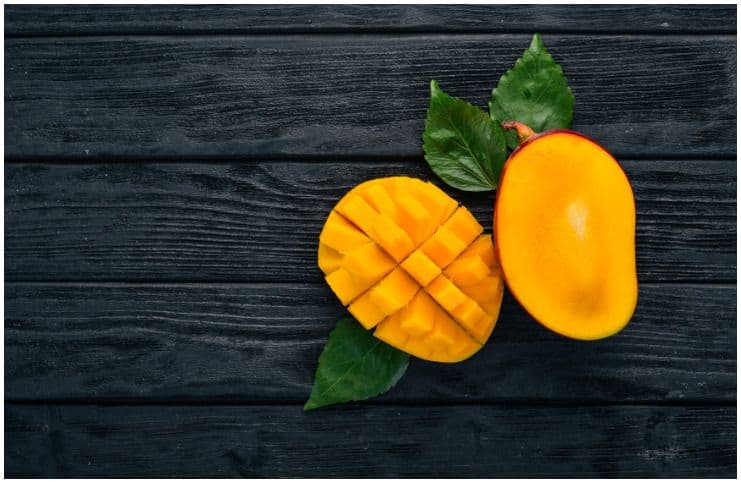Papaya
It is a small, bushy tree with a hollow trunk and oblong smooth-skinned fruits. Once believed to be native only to Central America and Southern Mexico, it is now frequently found in every subtropical and tropical country.
It has been famous for centuries and it was once named the “fruit of the angels” by Christopher Columbus.
Presently, India is the main producer of these fruits, over 5 million tons per year, according to the Food and Agriculture Organization of the United Nations.
Nutrition Facts
It is an excellent source of dietary fiber, sodium, iron, vitamin B1, vitamin A, vitamin C, vitamin B3, magnesium, vitamin B2, potassium, vitamin B9, calcium, vitamin B6, and phosphorous.
This fruit is also very low in calories (about 43 calories/100g) and has no cholesterol. Also, the seeds contain a unique anthelmintic alkaloid, named – carpaine, which has been shown in studies to be very effective at killing parasitic worms.
Health Benefits
Natural Relief For Menstrual Cramp
It contains an enzyme, named – papain, that is used to counter inflammation in the throat and to relieve digestive complaints. Also, people have used this fruit to tenderize meat since this enzyme can break down protein chains found in muscle meat.
Additionally, women who are regularly experiencing menstrual pain should consume a few servings of this fruit a day, because papain helps in regulating and easing flow during menstrual periods.
Lowers LDL And Total Cholesterol
This amazing fruit is a source of dietary fiber, a nutrient that absorbs toxins in the large intestine and eliminates them from the human body through a bowel movement.
According to recent research, people who have a high intake of foods rich in fiber can lower their LDL blood cholesterol levels (associated with a high risk of heart disease and stroke) considerably.
Excellent Source Of Vitamin C
Vitamin C promotes tissue strength by enhancing the production of collagen, a protein found in the skin, bones, blood vessels, tendons, and other tissues.
Low levels of this vitamin have been linked with a variety of disorders, including – gallbladder disease, hypertension, some types of cancers, stroke, and atherosclerosis (also referred to as the hardening of the arteries) – which can lead to a heart attack.
Great For Your Eyes
This tropical fruit contains approximately 184 mcg of beta-carotene, a precursor to vitamin A, only found in plants. The beta-carotene content prevents the development of age-related macular degeneration as well as lung and oral cavity cancers.
Side Effects
It has no side effects. However, its overconsumption may cause some people to experience flatulence, nausea, abdominal cramps, bloating, and stomach ache.
Mango
It is a member of the genus Mangifera (with the scientific name – Mangifera indica) and has an outer fleshy part surrounding a shell which contains a seed.
Nutrition Facts
It contains potassium, iron, phosphorus, vitamin B6, calcium, niacin, sodium, copper, riboflavin, zinc, vitamin A, selenium, folate, vitamin E, vitamin C, thiamin, vitamin K, choline, pantothenic acid, protein, and fiber.
This fruit also contains potent antioxidants, including – fisetin, quercetin, astragalin, isoquercitrin, methyl gallate, and gallic acid.
Health Benefits
Improves Digestion
One cup of this fruit has about 12 percent of the daily recommended intake of dietary fiber, an essential nutrient that helps keep the digestive system running smoothly.
More importantly, a diet high in fiber shortens the time waste spends in your large intestine, therefore, lowering the risk of colon cancer.
Dietary fiber also has a beneficial effect on eliminating degenerative diseases, such as – heart conditions and some types of cancers, according to a study issued in the Comprehensive Reviews in Food Science and Food Safety.
Eye Health
It contains flavonoids, such as – beta-carotene, alpha-carotene, and beta-cryptoxanthin, potent antioxidants that promote good eyesight and prevent night blindness.
Carotenoids are a precursor of vitamin A, which is vital for eye health. A deficiency of vitamin A may lead to problems seeing in all types of light conditions or night-blindness.
In addition, beta-carotene protects the human body against breast, colon, and prostate cancers. Also, individuals who regularly eat beta-carotene rich foods can notably reduce their risk of developing asthma.
Decreases Cramps
The presence of potassium in this tropical fruit regulates the fluid mechanism and blood pressure in the human body. Another important benefit of consuming fruits rich in potassium is improved muscle strength and decreased muscle cramping.
Side Effects
There are no known side effects.
Papaya vs Mango – Which Has A Better Nutritional Profile?
These fruits have a similar nutritional profile, however, papaya is better regarding its vitamin A, vitamin C, folate, and potassium content.
Image credit – Shutterstock
READ THIS NEXT: Pecans vs Walnuts
